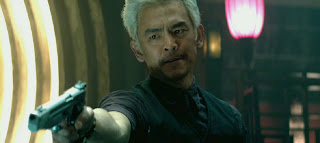 |
| Colin Farrell, getting his vacation on. |
The reboot of Total Recall made $26M opening weekend, less than the third weekend of The Dark Knight Rises. Considering the film's $125M budget, that's bad news. Many interesting theories as to why this happened, the best being the idea that few moviegoers can be convinced to pay for a film they have already seen. Personally, I see the dark, tentacled hand of The Martian Curse at play. The original is one of the few films set on the Red Planet to see huge success: The remake, scrupulous to avoid this pitfall, is entirely set on earth. Now it seems obvious the Martian Curse was not avoided in 1990: It was merely delayed 22 years.
 |
| A wonderfully badass John Cho (Harold and Kumar) is the Rekall operator in the remake. His part was played by Ray Baker (one of my favorite character actors) in the original. |
I thought it would be fun to compare the original and the remake point-to-point:
DIRECTORIAL STYLE
1990 – Paul Verhoeven had skills which made TR 1990 memorable: clean, obvious (maybe too obvious) storytelling skills; a delight in weird, gory effects; strong colors and and a sense of ironic fun. Verhoeven played with ideas of what was true and what was fictional in all his previous American films (especially Starship Troopers, a propaganda film from a fascist future, an ironic twist which flew over the heads of most).
2012 – Fremont's own Len Wiseman must have been Columbia's perfect choice for this property: He knows how to work with effects, has a dark, fast-action, dynamic style, and showed he can helm a tentpole picture with Live Free or Die Hard (2007). But the underwhelming box office for this film indicates Mr. Wiseman was probably not the sole author of that film's success: Live Free had a tight story (it took nearly a decade to write) and a star (Bruce Willis) with three to four times the charisma than Colin Farrell.
(I am going to ding Mr. Wiseman for a very annoying tic he uses in Total Recall, one he blatantly stole from J. J. Abrams: At every opportunity he shines light into the lens, smearing lens flares like 4th of July fireworks. Making audiences squint until teary-eyed is not good cinematography, Len.)
PLOT DETAILS
1990 – Verhoeven had a superior script by Dan O'Bannon and Ronald Shusett (Alien) to work with. Action and exposition were well-balanced throughout.
2012 – It's mostly indicative of how films are scripted these days: at about midpoint the action and effects-filled chase goes nonstop. It gets a bit deadening after a while.
 |
| Sharon Stone in the 1990 version, offering to help her husband forget his Rekall-induced delusion with some light bondage. |
1990 – Arnold Schwarzenegger was a marvelous fit for a Paul Verhoeven film: he was big, obvious, faintly silly, and had a knack for delivering great punchlines (“Consider this a divorce!”). Hell, he WAS a punchline: He played a normal schmoe who dreamed of a life of an action hero. The audience was definitely in on that joke.
2012 – Colin Farrell does a much better job than Arnold was capable of in conveying the subtleties of Doug Quade: the confusion and lost and recovered memories, the terror of being hunted. But there's that low charisma thing: He starred in Fright Night, another 80s revival film last year that failed to capture big audiences. Let's just call Colin Farrell the Irish Matthew McConaughey, another actor they keep shoving into lead roles, hoping he'll spark.
LEAD WOMEN
1990 – Rachel Tocotin was Melina, Quade's object of desire. Nice idea, but she never ignited. Sharon Stone, however, was amazing as Lori, Quade's wife/minder assassin: she slinked and hissed and gave the world a preview of what she was capable of in Basic Instinct (1992).
 |
| Jessica Biel, in a typical pose, showing a large expanse of bare wrist and a hint of forearm. |
2012 – Len Wiseman's wife Kate Beckinsale is Lori, switching from nice wife to dead-eyed murder machine. In other words, she's Selena from the Underworld series minus the kinky wardrobe. Jessica Biel (and her killer cheekbones) is Melina. What's odd is the two are indistinct at a distance: two willowy brunettes. When they fight it almost looks like a special effect. Also (and this is a guy-film complaint) the 2012 version is about a hundredth as sexy as the 1990 version, despite the extremely attractive leads. Jessica Biel in particular is buttoned up to the chin in bulky clothing the entire film, which is almost a crime.
(Paul Verhoeven, in contrast, had no problem bringing on the sexy-- which was ultimately his downfall (Showgirls).)
Cohaagen, the villain of both films, was well-realized in both film: Ronny Cox played him in the original, oozing contempt and corporate privilege. Bryan Cranston plays him in the new film: It's perhaps another indication of how TV is surpassing film in depth these days to say that Walter White, Cranston's character from AMC's “Breaking Bad,” is a hundred times scarier.
Oh yeah I read this when it posted. Total Forgetfulness.
ReplyDelete